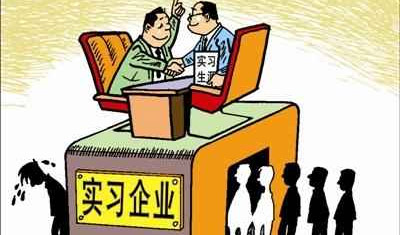
Liu Yuan

Lou Yu

Kou Yingjie
Outpatient problems
How to protect the rights and interests of interns?
Outpatient specialist
Researcher of Shaanxi Academy of Social Sciences   Liu Yuan
Associate Professor, Institute of Social Law, China University of Political Science and Law   Lou Yu
Lawyer of Beijing Bank of China Law Firm   Kou Yingjie
Expert opinion
◇ Interns are very replaceable, and it is easy for the unit to use its own advantages to recruit cheap labor, even free labor.
◇ According to the Regulations on the Management of Students’ Internship in Vocational Schools, the internship unit shall not arrange interns in vocational schools to work overtime or practice on legal holidays.
◇ Establish an organization similar to a trade union, which is responsible for receiving the demands of interns and specifically protecting the rights and interests of interns.
Colleges and universities should take the initiative to contact internship units for students and sign internship agreements with internship units; At the same time, in the process of students’ internship, the relevant responsible personnel of the school should follow up and protect them.
◇ For students’ internships in colleges and universities, the relevant departments should issue clear laws and regulations to stipulate the internship standards recognized as labor relations and the supervision obligations of schools. If there is any violation, schools and enterprises will bear joint and several liability.

Information picture
"I go to work at 8: 00 the first night, and I can only get off work at 7: 50 the next morning. I work for nearly 12 hours every day. I am not allowed to rest during my internship, and I am not allowed to ask for leave when I am sick …" Recently, this article published by Guangxi netizen Mo Xiao in Weibo attracted everyone’s attention. As graduation approaches every year, a large number of prospective graduates begin to look for job internships. Practice can be said to be a compulsory course for every college student, which can not only get credits for the "social practice" of the school, but also increase social experience and accumulate experience for future employment. However, in recent years, there have been many disputes about internship. Some people have worked hard for several months, but they can’t get internship wages and subsidies. Some people work overtime all night and can’t rest on holidays …
Does the intern have a labor relationship with his company?
Lou Yu, an associate professor at the Institute of Social Law of China University of Political Science and Law, said that there are three common employment methods between students and employers: the first is work-study program; The second is practice, that is, the work of consolidating the knowledge learned in class and improving the ability through practical training; The third is the job of prospective graduates, that is, the job aimed at employment before graduation. In the third case, students fully perform all the duties of their internship positions, which is also called "on-the-job internship". "Generally speaking, many countries will treat’ internship’ as a labor relationship. In 2010, the communique issued by the Supreme People’s Court also had the same statement. " Lou Yu said that as long as the content of labor conforms to the characteristics of establishing labor relations, it should be recognized as labor relations. "It is not entirely possible to judge whether the two parties have signed a labor contract or paid labor remuneration."
In this regard, Kou Yingjie, a lawyer of Beijing Bank of China Law Firm, believes that in principle, there is no labor relationship between interns and internship units, and it is not subject to the adjustment of labor law and labor contract law. There is a common civil legal relationship between interns and internship units, which is protected and adjusted by civil law and contract law.
Many factors together cause interns to become cheap labor.
The author searched online and found that there were media reports that a well-known factory illegally hired interns to work overtime to assemble mobile phones. Six students said that the school sent a total of 3,000 interns here for "compulsory" internships. They worked for 11 hours every day and were told that they needed to work in this factory for three months before they could graduate. In fact, many college students and vocational college students have been forced to work overtime and work night shifts. What’s more, some vocational schools act as contractors in student internships, using student labor cheaply or even free of charge, which greatly damages students’ rights and interests.
"There are many reasons for this phenomenon." Lou Yu said that interns are highly substitutable, and it is easy for companies to use their advantages to recruit cheap labor, even free labor. Secondly, some schools force students to provide labor as interns on the grounds of graduation in order to seek illegitimate interests from enterprises. In addition, the current laws and regulations do not clearly define the legal nature of internship, which leads to different recognition of the legal nature and standards of internship by local courts and arbitration institutions. These are the reasons that lead to the phenomenon of forced overtime in enterprises.
"China’s labor force is abundant, and employment pressure is a problem that every graduating student will face. From the perspective of enterprises, the value that interns create for enterprises is limited." Kou Yingjie said that many factors have caused interns to be treated as cheap labor. Although this is not what we want to see, it can only be gradually reversed according to the current situation of the job market.
"No enterprise is willing to do business at a loss. Interns generally cannot have the same skills and experience as regular workers, and their appeal to enterprises is limited, and internship is a necessary means to cultivate talents. " How to effectively solve this contradiction? Lou Yu suggested that the state give enterprises preferential tax policies when recruiting interns, especially "on-the-job interns" as laborers.
Kou Yingjie suggested that social guidance and publicity should be strengthened, and the government and schools should work together to change some bad ideas of enterprises on interns. Let interns contribute to the enterprise, but also get basic respect, treatment and protection.
Interns who encounter forced overtime can complain to relevant departments about their rights protection.
"According to the Regulations on the Management of Students’ Internship in Vocational Schools, internship units may not arrange interns to work overtime or practice on legal holidays." Kou Yingjie said that if the internship unit is forced to work overtime, the vocational school can adjust the internship arrangement according to the situation and require the internship unit to bear relevant responsibilities according to the internship agreement.
However, for students in ordinary colleges and universities, there are no clear restrictive provisions in the law at present. As long as interns voluntarily accept it, it is not prohibited by law. At the same time, because the two sides are not labor relations and are not subject to labor laws, enterprises do not have to pay overtime. "If the intern has a clear agreement on overtime and overtime payment in the internship agreement signed with the enterprise, it will be implemented according to the agreement of both parties." Yan Yingjie added.
In Kou Yingjie’s view, interns should not blindly obey such situations. They can report to schools, education departments and labor departments, and call the police if necessary. The most important thing is to protect their own safety and health. However, if the intern is injured during the internship, the internship unit needs to bear the corresponding compensation responsibilities, such as paying medical expenses, treatment expenses, nursing expenses, disability compensation, etc. Therefore, enterprises can take out commercial insurance such as personal accident insurance for interns during their internship to protect the interests of both parties.
Liu Yuan, a researcher at Shaanxi Academy of Social Sciences, said that an organization similar to a trade union can be established to receive the demands of interns and specifically protect the rights and interests of interns. In Lou Yu’s view, if the internship is recognized as a labor relationship, then the unit receiving the intern should abide by all kinds of labor and social security laws and regulations represented by labor law, labor contract law and social insurance law, and treat the interns’ vacation and overtime rights according to ordinary workers.
Protecting interns’ rights and interests requires joint efforts of many parties.
"It is the school’s obligation to arrange student internships." Kou Yingjie suggested that colleges and universities should take the initiative to contact internship units for students, and sign internship agreements with internship units, so as to safeguard the legitimate rights and interests of students from the perspectives of safeguarding their vital interests and effectively achieving the internship effect. At the same time, during the internship process, the relevant responsible personnel of the school should follow up and protect them. If the school is irresponsible and causes students to get hurt during the internship, it is an unfulfilled obligation of management and protection, and the school needs to bear the supplementary liability for compensation.
Lou Yu suggested that the relevant departments should issue clear laws and regulations on the internship standards recognized as labor relations and the supervision obligations of the school. If any violation of the above standards or supervision obligations causes damage to the interns, the school and the enterprise shall bear joint liability.